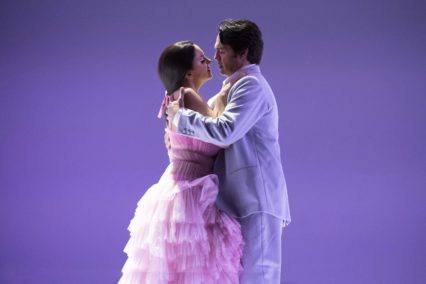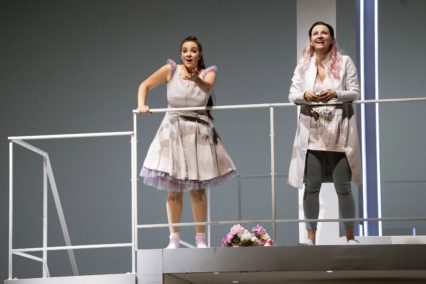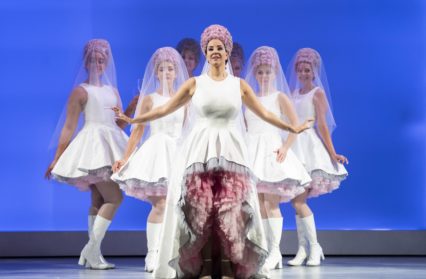Welsh National Opera’s new production of Puccini’s Madama Butterfly replaces one of the most popular in its repertory. Nigel Jarrett was at the opening night at the Wales Millennium Centre to see how it shaped up.
Great art always transcends its time and place – always. So it might seem patronising for a theatre or opera director to suggest that audiences do not understand the universal relevance of a scenario set in the remote, or not-so-remote, past. Puccini’s Madama Butterfly, for example, specifically about a crass American naval officer who marries a teenage geisha for cheap thrills, generally about the clash of Western and Far Eastern cultures, and ultimately about the way some men will always treat some women, might be considered to need no refurbishment for modern sensibilities. Ridding the opera of its locale, however, and substituting an indeterminate one designed to expose the inhumanity at its core, might be thought to suggest that it never had any historical context; indeed, any context at all, or that such behaviour had any basis in reality.
In devising her new production of Madama Butterfly for Welsh National Opera, Australian director Lindy Hume knew she would be replacing a famous one that had been in the company’s repertory for over forty years. Not the least interesting feature of Joachim Herz’s sepia-washed version was its refusal to flinch from hidden minutiae – that the older culture was not without its boorishness and rigidity; that there was such a thing as the Imperial Japanese colonial empire, as viciously promoted as any other around the time the opera was set; and that Butterfly herself, Cio-Cio-San, may have been no better than she ought to have been. Hume refers to sex trafficking, the ‘resonances’ of American and British colonialism and young-adult suicide rates as among the elements of modern life which bring Butterfly up to date. The names Weinstein and Epstein must have been in her thoughts. But you’d have to have a narrow view of history, particularly an obsession with Western self-flagellation, to think that these were just contemporary phenomena, even when wishing society should by now have had done with them.
The unspecified in Hume’s vision allows her designer, Isabella Bywater, to people the stage with costumes for the crowd that in a few cases seem to have been conceived by Tim Burton on Diazepam. Others resemble hospital orderlies or are chic enforcement officers. Butterfly’s two-tier condo, floating in nebulous pastel space, revolves so much that one begins to wonder if swivelling sets aren’t really as outmoded as theatregoers have come to believe. It’s prettified early on with some clever but brief video projections by Ash Woodward. Though the characters are supposed to be divested of predicates, their conventions and protocols are clearly being followed and ‘Lieutenant’ B. F. Pinkerton (the ringing tenor of Leonardo Caimi) is still arriving on a warship. Where is this? Who are these people? If we are being enlightened, why are we asking these questions? Perhaps it doesn’t matter as long as our attention is concentrated on Butterfly and her plight.

Hume scores in managing to achieve that, and only that. Her Butterfly (Joyce El-Khoury in majestic voice and a glittering Butterfly debut) is a modern young woman abandoned by a modern man of about the same age and left among domestic drudgery to hope for his return. Once that focus is established, the details she describes are telling. She doesn’t enable Puccini to encourage the old melodramatic trick of allowing Butterfly at the same time to disclose to the audience as well as to the ‘Consul’ Sharpless (the excellent Mark Stone) that she has a child at the point where she discovers that Pinkerton is not what he had seemed. The boy, played by girls on rota in this production, has made an appearance beforehand as a matter of course in the cramped domestic setting below stairs. In this distaff bastion, there’s a Wickes kitchen suite, a packet of corn flakes, two washing machines waiting to be filled (Butterfly’s obviously taking it in to make ends meet), a pile of rubbish bags put out for collection, and even a ‘Thank you NHS’ rainbow poster stuck to a cupboard. Above all there’s Butterfly’s pal Suzuki (a splendid strength-of-character study from Anna Harvey), a woman helping out another woman in extremity. Hume works hard to disguise the over-ministering of the character’s traditional status as Butterfly’s maidservant so as not to portray the heroine as a superior and preoccupied slattern, and it quickly comes to represent a scene of all-female devotion and support. Among the production’s achievements is la notte dell’attesa, Butterfly’s nocturnal wait for Pinkerton to turn up, lit by Elanor Higgins with an almost-uncanny indication that dusk and dawn come with temperature changes.
The smaller parts, including Butterfly’s determined suitor ‘Prince’ Yamadori (Neil Balfour) as a young man not an entitled old roué, and the slippery marriage broker Goro (Tom Randle), appear in and out of Hume’s undefined mise en scène, the chorus resembling visitors from another world. Sometimes they are static, at others over-choreographed. But their remoteness in time and space keeps Butterfly and her ordeal foregrounded. Mezzo Sian Meinir steps up from the WNO chorus to join the principals as Kate Pinkerton.
Hume further removes Puccini’s histrionics by making Butterfly’s suicide – she shoots rather than stabs herself – silent and unseen as the revolve completes another remorseless turn and after her child has been taken away. (The sight in other productions of Butterfly blindfolding the boy and killing herself in his presence has always seemed cruel and selfish.) Before she dies, Butterfly writes the word HONOR on her bedroom blind. Note the American spelling: it’s a slap-in-the-face reminder to the man who has deserted her and left her bereft. Beside such enormity, Hume is saying, the native custom she has dishonoured, bawled at her by the formidable Bonze (the equally formidable Keel Watson) is a trifle, or at least a departure with which her culture needs to come to terms. Hume no doubt allows us to ponder that Pinkerton’s remorse will not stop his fellows doing the same thing and mostly with less disastrous consequences, and that, in taking her life, Butterfly has at last and paradoxically assumed control of it.

Perhaps because the audience’s mind is suffused with things Japanese whenever another production of Butterfly comes along, Hume’s appears sluggish at the start, despite WNO conductor-laureate Carlo Rizzi’s determination to set the music alight from the off. What a thrill it was on the first night to hear this fine opera orchestra playing live again with such voluptuous sense of phrasing and dynamic, as it had done, mutatis mutandis, a couple of weeks before with Giles Havergal’s perennial version of Rossini’s Il Barbiere di Siviglia (The Barber of Seville), churlishly nit-picked by some commentators because WNO had chosen it to return to performing in public. There must have been good reason why the company didn’t high dive with Hume’s creation.
It couldn’t have been easy for Hume and her team to follow Herz’s classic. Her single-mindedness is rewarded with a show that slowly blossoms, despite some visual eccentricity and ‘biospherical’ sterility. On her WNO début – it was Bywater’s too – this Butterfly won’t do her reputation any harm.
Nigel Jarrett is a regular Wales Arts Review contributor. He’s a former daily-newspaperman and a double prizewinner: the Rhys Davies award for short fiction and the inaugural Templar Shorts award. He is formerly music critic of the South Wales Argus. His first collection of stories, Funderland, was warmly reviewed in the Independent, the Guardian, and the Times. He is also the author of a poetry collection, a novel, and two other story collections. His work is included in the two-volume anthology of 20th– and 21st-century Welsh short fiction. He lives in Monmouthshire.
All Photos of Welsh National Opera’s Madam Butterfly credited to Richard Hubert Smith.



 Enjoyed this article? Support our writers directly by buying them a coffee and clicking this link.
Enjoyed this article? Support our writers directly by buying them a coffee and clicking this link.







